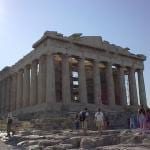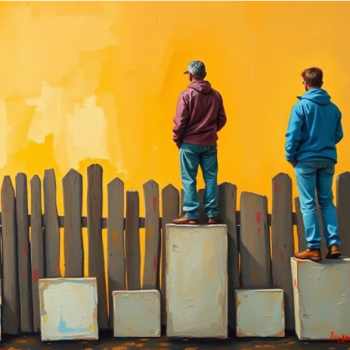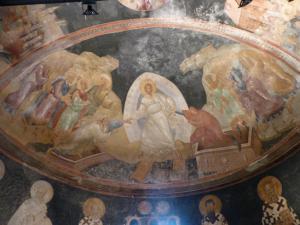 If a nation will not pay reparations, they might at least avoid committing the same crime again.
If a nation will not pay reparations, they might at least avoid committing the same crime again.
For one thousand years, almost without interruption, a culture flourished, grew, sustained classical education, and then was brutally snuffed out by conquerers. The most holy places of this people group were appropriated by the winners and children were enslaved to serve the masters. For centuries the “losers” were kept as second-class subjects, or worse. They could act as servants when they were not subject to periodic extermination.
The past was glorious and the conquered remnant kept their holy places as best they could. They were militarily, not spiritually, beaten. Sadly, these brave peoples lacked allies.
When Europeans came to study history, they blasted through this culture to get to older times that interested them. The Eastern Romans, artists, philosophers, theologians, builders, are forgotten, given the label Byzantine, and their thousand year history stereotyped as one of decline. Languages like literary Arabic were preserved by the faithful under subjection and the Greeks never have forgotten or ceased to create beauty with the language of the Eastern Romans.
The great city, Constantinople, now Istanbul, even in captivity was home to tens of thousands of Eastern Romans, but over time, battered by conquest, the numbers dwindled. Still, brave men and women endure in the tiny section of the city left to them. They worship as their mothers and fathers worshiped. They rejoice when archeology uncovers some of the beauty of their past. The glories of Hellenism span centuries. They include the father of philosophy, the master of all who know, and for most of her history the Orthodox Christian faith. That faith saved the noble pagan philosophers for all of us. Any educated person must be a philhellene, but somehow a love of Hellenistic culture, literature, and art does not lead to a defense of the people.
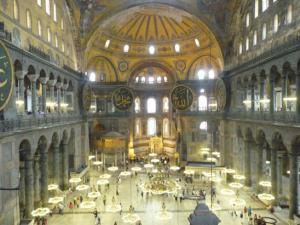 The last time I was in the city, touring the remnants of this glory, the conquerors were celebrating the conquest. I had come on a Tuesday of the conquest (intentionally) to see this city sacred to my church and the sounds of a party were hard to ignore. I asked the guide if this was a celebration of the end of Eastern Rome and he, of course, lied to me and said it was not. The lies about history and politics were continuous. I was told there was great religious freedom, that a church converted to a mosque had always been a mosque, that all people groups had equal rights. After a little bit of raki, I was also told that the conquerers would be in Rome soon and that this was better for the decadent Western Romans.
The last time I was in the city, touring the remnants of this glory, the conquerors were celebrating the conquest. I had come on a Tuesday of the conquest (intentionally) to see this city sacred to my church and the sounds of a party were hard to ignore. I asked the guide if this was a celebration of the end of Eastern Rome and he, of course, lied to me and said it was not. The lies about history and politics were continuous. I was told there was great religious freedom, that a church converted to a mosque had always been a mosque, that all people groups had equal rights. After a little bit of raki, I was also told that the conquerers would be in Rome soon and that this was better for the decadent Western Romans.
History keeps happening. The Eastern Romans are not gone, just kept at bay by conquerers who rightly fear the truth. Guarding all the city of Constantinople, now called Istanbul, there was and is the Church of the Holy Wisdom. She is smaller than a newer mosque nearby, but placed artistically geographically to dominate the skyline of the City. The icons of the Mother of God and the Lord Jesus Christ are, even when under plaster, reigning over the eternal city visually.
Ataturk, father of modern Turkey, wisely made Hagia Sophia, now after centuries holy to two faiths, a museum. It was a splendid act, a noble compromise. As a result, some of the most beautiful icons ever created were uncovered under the plaster where they had been hidden. Despite being defaced in places, they remain beautiful in a building designed for them and to host the liturgy of the Orthodox Church. The very acoustics of the building are built for the chant, the dome for the incense rising toward heaven, and the light for bringing the golden icons to life. The church was a window to heaven. As a museum, this was not entirely lost, a person could privately say a prayer and recollect the truth if he wished.
Much that was lost will never be forgotten and so lives.
Our Lord Jesus bids us love our enemies and history is very complicated. The old Eastern Roman Empire is gone. Over hundreds of years of rule the conquerors also created much, as image bearers of God, that was and is beautiful. The bill, the loss, since 1453, a blink of the historical eye (try to understand World War I without that date!), is too high for any payment. Yet mayhap any religious persons who appropriate the icons, who read Plato, who discuss the seven ecumenical councils, would take a moment to recollect the battered community of the faithful who just had another indignity heaped on their heads.
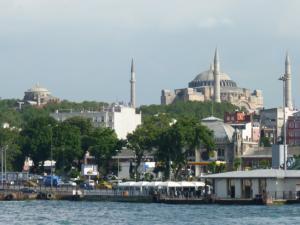 The Hagia Sophia is being turned back into a mosque and Constantinople falls again.
The Hagia Sophia is being turned back into a mosque and Constantinople falls again.
Perhaps one does not love the image of the beloved as much as the beloved, people are more important than buildings, but still the image of the beloved is venerated. Imagine that someone violated every picture of your mother. Time passes and you are able, if you do not talk too loudly about your mother, to see those pictures again. You accept this difficult, historical compromise, but then the pictures are defaced again.
This is hard. This is unnecessary. Nobody realistically thought the Orthodox would do the liturgy again in our Church, but perhaps our holiest place could have been left neutral as Ataturk made her?
Yet the truth is that the appropriation betrays weakness of the conquerors in the face of Hellenism and Eastern Rome. The prayer towers are obvious additions. Given even more raki, some of my hosts would admit to veneration of the Mother of God. When the appropriation did less good for the conquerers than the fruit of the fall did for the world, leading to a renaissance in the West, then powerless is that conquest and barren that appropriation.
Oddly, in Texas, far away from Constantinople, there are exiles from other nations, from every background, who learn Greek, read the old books, and live joyfully in a modern world. We do not yet even have a chapel, let alone a great church, but we are undaunted. Here, far away from the great icons of the Christ in that holy place, there is a simple College and School that remembers. We recollect what we owe to Holy Wisdom. Even those of us who are not Hellene are philhellene. We entrust this place to future generations of holy, wise, folk.
This College, this School, stands in solidarity with our spiritual Mother, the Hagia Sophia, not distant but our hearts’ true home.



